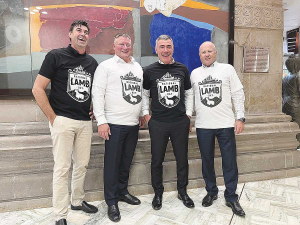Indian FTA
OPINION: Winston Peters' tirade against the free trade deal stitched with India may not be all political posturing by the wily politician.
 In India last week to promote NZ lamb, from left former Black Caps captain Stephen Fleming, Rob Hewett, Nathan Guy and Mike Pattersen. Source: Nathan Guy LinkedIn Page
In India last week to promote NZ lamb, from left former Black Caps captain Stephen Fleming, Rob Hewett, Nathan Guy and Mike Pattersen. Source: Nathan Guy LinkedIn Page
New Zealand's red meat sector is looking at exporting more than sheepmeat products to India when a comprehensive free trade agreement is secured between the two countries.
With negotiations formally launched in New Delhi last week, sheep farmers and processors are excited by the prospect of an FTA unlocking an important market that carries a 30% tariff on sheepmeat.
Meat Industry Association chair Nathan Guy, who was part of a business deligation to New Delhi led by Prime Minister Christopher Luxon, is excited about the prospect of an FTA with India.
"A robust and productive trade relationship between New Zealand and India provides many opportunities," says Guy.
"New Zealand has a great reputation as a trusted, reliable, and responsible trading partner. Like many developing countries around the world, India has experienced significant economic growth over recent decades and has a growing middle class with a focus on health and wellness, who are seeking high quality and nutritious animal protein options."
Guy says India is an expanding and dynamic economy with real potential for opportunities for New Zealand.
"As well as sheepmeat product, the wide range of by-products, known as the fifth quarter, provide significant opportunities for New Zealand, with offal exports boosted through the rise of the pet food industry and the strengthening demand for serum exports.
"India plays a key role in the pharmaceutical industry, manufacturing and exporting products such as vaccines to other countries. New Zealand's fifth quarter products are sought after because of our disease-free status."
B+LNZ chair Kate Acland points out that a comprehensive, commercially meaningful FTA could be one of the most important trade agreements secured since China.
"An FTA with India would unlock an important market that had previously been somewhat closed to us due to the 30 percent tariff currently on sheepmeat.
"There is immense potential of strengthening trade ties with India, which is set to become the world's third-largest economy within the next five years.
"By 2030, India is projected to have an additional 140 million middle-class households and 21 million high-income households.
"With rising demand for high-quality, nutritious sheepmeat and domestic production unable to meet this demand, New Zealand is well-placed to supply premium products to this growing market."
Beyond sheepmeat, India offers significant market opportunities for New Zealand co-products, including pharmaceuticals, wool, and pet food.
"A comprehensive and commercially meaningful FTA must deliver tariff liberalisation for these products and reduce non-tariff barriers to ensure increased access for New Zealand exporters," says Acland.
A sticking point in any FTA with India would be dairy. As the world's largest producer of milk, most of which is consumed by the farmer and his family, the Indian Government will be wary of a potential backlash by powerful farmer groups.
Quick Deal Please!
A group representing the country's business leaders says that a comprehensive FTA with India should be concluded as soon as possible.
The NZ International Business Forum (NZIBF) says it believes there's "enormous value to be gained from comprehensive FTA with India".
NZIBF chair and NZ Winegrowers chief executive Philip Gregan wants a deal as soon as possible.
"While this marks the start of a renewed negotiating process between our two countries, there is also a need to accelerate the work underway to build the relationship with India across all sectors," says Gregan.
"This will assist in establishing a strong basis for a high quality and ambitious agreement, including in sectors previously considered off-limits.
"We should be seeking to address as many issues in the economic relationship as possible, including tariffs and non-tariff barriers in all sectors of interest, along with a body of effective trade rules reflecting the progress we have both made in other agreements.
"The difficult state of the world trade environment points to the need to conclude these negotiations as soon as possible and we welcome the two governments' clear commitment to that end," he says.
One team with 43 head, including a contingent from Mid Canterbury, are reflecting on a stellar NZ DairyEvent.
Fonterra farmer shareholders have approved the mechanism for a $2/share capital return expected from the sale of its global consumer and associated businesses.
Trainees in the horticulture industry studying towards a certificate or diploma can now apply for Horticulture New Zealand's (HortNZ) 2026 Industry Training Scholarships programme.
OPINION: The first three Global Dairy Trade (GDT) auctions have been a morale booster for farmers.
Former Fonterra executive Alex Turnbull has been appointed CEO to lead all five Yili Oceania Business Division companies in New Zealand.
Fonterra executive René Dedoncker is leaving the co-operative later this year to lead Australian agribusiness Elders.

OPINION: Here w go: the election date is set for November 7 and the politicians are out of the gate…
OPINION: ECan data was released a few days ago showing Canterbury farmers have made “giant strides on environmental performance”.